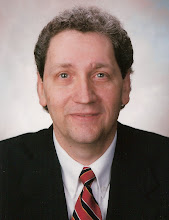The ship's captain strained to see ahead in the darkness and saw faint lights headed toward him. Immediately he told his signalman to send a message:
"Alter your course 10 degrees south."
Promptly a return message was received: "Alter your course 10 degrees north."
Angered, the captain sent a second message: "Alter your course 10 degrees south--I am the captain!"
The reply was: "Alter your course 10 degrees north--I am seaman third class Jones."
Immediately the red-faced captain sent a third message: "Alter your course 10 degrees south--I am a battleship!"
Then the reply came "Alter your course 10 degrees north--I am a lighthouse."
Here's why I laugh at that story every time I read it: it's funny when the absolutes of life rudely confront people who don't believe that life has absolutes. Watching them try to avoid the absolutes can be great entertainment. Or it can be sad.
I feel some of that sadness when I see churches try to avoid the obvious conclusion: the Holy Spirit came to earth to oversee the church's effort to spread the gospel. The Father rules from His throne in heaven, the Son reigns glorified at His Father's right hand, but the Holy Spirit is here. He's on earth to guide the church to victory in her assignment.
So many of us spend so much time trying to avoid that. We search for just the right program, the right preacher, the right book on church growth, the right entertaining agenda, the right seminar speaker, the right... well, you understand.
These things are fine in themselves, but they aren't the answer. The answer is to deepen the church so she can grow wider. A "spiritual" group of people will have little or no problem attracting converts or keeping them.
Here's an illustration. When the church at Antioch wanted to launch new missions to the Gentiles, their prophets and teachers gathered to fast and worship the Lord (unique idea... wonder if that would work today?).
When they did so, "The Holy Spirit said, 'Set apart for me Barnabus and Saul for the work to which I have called them.'" (Acts 13:1-3 NIV).
Did you catch that? The Holy Spirit said? The Holy Spirit has a voice? He can speak and make Himself understood by the church? And He intends to guide the program Himself? Amazing.
And notice this. After the church at Antioch had "fasted and prayed, they placed their hands on them and sent them off."
Look at how, from then on, the Spirit actually "micromanaged" Paul's work:
"Paul and his companions traveled throughout the region of Phrygia and Galatia, having been kept by the Holy Spirit from preaching the word in the province of Asia. When they came to the border of Mysia, they tried to enter Bithynia, but the Spirit of Jesus would not allow them to." (Acts 16:6-7 NIV - emphasis mine).
The Holy Spirit aggressively led the early church through her mission. As you read the 28 chapters of the Book of Acts, you'll notice the Holy Spirit mentioned 57 times (NIV)! He was running the operation.
So, to be "spiritual", a church today must recognize the absolute authority of the Holy Spirit over her work on earth.
"And if anyone does not have the Spirit of Christ, he does not belong to Christ... those who are led by the Spirit of God are sons of God." (Romans 8:9,14 NIV).



